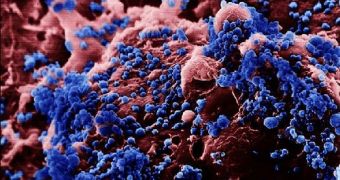Criminals have no chance. A new human identification test relying on antibodies seems to be faster and cheaper than DNA testing, besides requiring minimal training in the field, improving the arsenal of detectives, forensic experts and the military. Our antibody signature is as unique as our DNA, and antibodies, proteins fighting against germs, can be tracked from blood, saliva or other bodily fluids.
"DNA is a physical code that describes you... and in many ways so are your antibodies," said Dr. Vicki Thompson, a chemical engineer at the Idaho National Laboratory who has worked for the past 10 years at perfecting the test.
The technology was licensed exclusively to Identity Sciences LLC in Alpharetta, Ga. Test kits and training specialists for the new technology could reach law enforcement, the military, forensic and medical labs worldwide by the end of 2009.
"The test is not intended to supplant DNA testing, the recognized gold standard in human identification. But the value of antibody profiling is as a screening tool to help make sense of a crime scene, sort out the blood trails or spatter from multiple victims or more quickly identify body parts on a battlefield or at the scene of a disaster like the Sept. 11, 2001 attacks. It may also reduce the number of DNA tests required in an investigation, potentially saving time and money and easing the growing backlog," said Ken Haas, vice president of marketing.
The test can deliver results based on the blood serum or dried blood in just two hours, compared to long period of time necessary for DNA tests. Some warn that a big issue for the new test is the non-existence of a national antibody database, a fact impeding the use of the test in order to connect suspects to crimes or to justify an arrest warrant.
The company stated that beta testing by forensic scientists at simulated crime scenes in 7 US locations have showed a huge potential for the new technology. At the moment, the cost of field kits has not been revealed but, anyway, they will be much cheaper than DNA analysis, which is currently between $500 to $3,000 per sample because of the complex equipment and lab time.
"We don't see this yet as a product to take to court. But we do see this as a way to get the case moving forward toward a final, legal resolution," said Gene Venesky, vice president of Identity Sciences.
However, it seems that it will take some time for the test to be accepted in state and federal courthouses. As in the case of any new technology, this test too will see its validity challenged by defense attorneys.
"If these tests are going to get to the courtroom, which I think is inevitable, they are not going to be admissible as evidence until they can be proven reliable, accurate and trustworthy. My bet is that a crime scene unit is going to be very careful about using this if it's not going to be of any benefit in litigation," said Lawrence Kobilinsky, a DNA expert and chairman of the Department of Forensic Science at John Jay College of Criminal Justice in New York.

 14 DAY TRIAL //
14 DAY TRIAL //